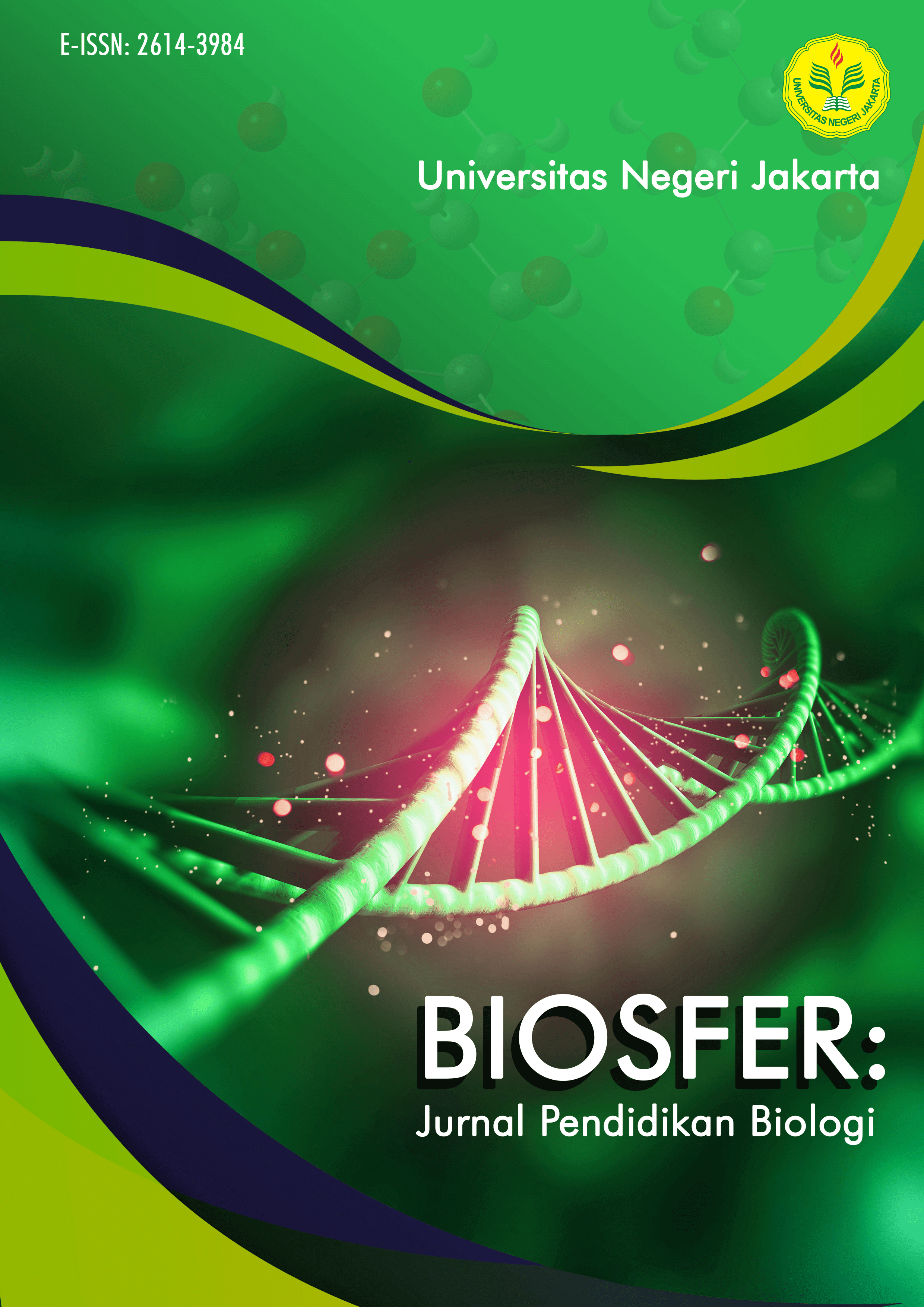Identification of learning dificulties and factors causing learning difficulties in online lectures on basic biology concepts
DOI:
https://doi.org/10.21009/biosferjpb.32851Keywords:
Basic concepts of Biology, Learning difficulties, Online lecturesAbstract
This study aims to identifying learning difficulties from reviewing material and factors causing learning difficulties faced by Madrasah Ibtidaiyah Teacher Education study program in online lectures basic concepts of biology. The research particiants were 80 third-semester in 2021/2022 academic year. The research method used quantitative. The data collection technique in this study is a survey technique. The research instrument is a questionnaires were made to collect student data regarding learning difficulties in basic concepts of biology and the factors that cause student learning difficulties. Questionnaires were given to students via a google form. The data analyzed by descriptive statistics and used as reference data to determine the learning difficulties faced by students in the form of subject matter, internal and external factors causing learning difficulties. The results showed: a) In online lectures on basic concepts of biology, the material that students consider the most difficult is genetics, b) Internal factors that cause learning difficulties are lack of preparation before lectures, too much memorization, lack of self-motivation, physical tiredness, and laziness to read the material, c) External factors that cause students’ learning difficulties in basic biology concepts lectures, namely lectures resources and materials, lecture facilities, lecture strategies, lecture environment, and lecture hours.
References
Amalia, NF & Susilaningsih, E 2014, ‘Pengembangan Instrumen Penilaian Keterampilan Berpikir Kritis Siswa SMA Pada Materi Asam Basa’, Jurnal Inovasi Pendidikan Kimia, vol. 8, no. 2, pp. 1380-1389
Anggeni, YD, Festiyed, F, Asrizal, A 2019, ‘Meta-Analisis Pengaruh Model Pembelajaran Project Based Learning Terhadap Kemampuan Berpikir Kritis Peserta Didik SMA’, Pillar of Physics Education, vol. 12, no. 4, pp. 881-888.
Arends, RI 2012, ‘Learning to Teach: 9th Edition’, New York: McGraw-Hill.
Arifin, Z 2017, ‘Kriteria Instrumen dalam Suatu Penelitian’, Jurnal THEOREMS , vol. 2, no.1, pp. 28-36.
Asrizal, A, Amran, A, Ananda, A, Festiyed, F 2018, ‘Development of Adaptive Contextual Teaching Model of Integrated Science to Improve Digital age Literacy on Grade VIII Students’, International Conference on Science and Technology, vol. 1116, pp. 1-9.
Asrizal, A, Hufri, H, Festiyed, F 2015, ‘Development of Authentic Assesment for Supporting the Inquiry Learning Model in Basic Electronics 1 Course’, ICOMSET.
Azwar, S 2015, ‘Reliabilitas dan Validitas’, Yogyakarta: Pustaka Belajar
Ennis, RH 1985, ‘A Logical Basic for measuring critical thingking skills’, Association for Supervision and Curriculum Development.
Facione, PA 2015, ‘Critical Thinking: What is it and Why it Counts’, Insight Assesment, no. 1, pp. 1-23.
Hassoubah, ZI 2014, ‘Developing Creative & Critical Thinking Skills’, Bandung:Yayasan Nuansa Cendikia.
Herliandry, LD, Ahmad, H & Jannatin, A 2019, ‘Kemampuan Berpikir Kritis Fisika Peserta Didik Kelas X dengan Model Brain Based Learning’, Jurnal Penelitian Pendidikan IPA (JPPIPA), vol. 5, no. 1, pp. 39-47.
Husnah, M 2017, ‘Hubungan Tingkat Berpikir Kritis Terhadap Hasil Belajar Fisika Siswa dengan Menerapkan Model Pembelajaran Problem Based Learning’, Journal of Physics and Science Learning (PASCAL), vol. 1, no. 2, pp. 10-17.
Jamaluddin, A, Jufri, W, Muhlis, M & Bahtiar, I 2020, ‘Pengembangan Instrumen Keterampilan Berpikir Kritis pada Pembelajaran IPA’, J Pilar MIPA, vol. 15, no. 1, pp. 13-19.
Kusuma, W, Basirudin, B & Soraya, S 2021, ‘Peningkatan Kreativitaas Mahasiswa Melalui Penyusunan Instrumen Penelitian’, Jurnal pengabdian Pada Masyarakat, vol. 1, no. 2, pp. 143-148.
Latifa, BRA, Verawati, NNSP & Harjono, A 2017, ‘Pengaruh Model Learning Cycle 5e (Engage, Explore,Explain, Elaboration, & Evaluate) Terhadap Kemampuan Berpikir Kritis Peserta Didik Kelas X MAN 1 Mataram’, Jurnal Pendidikan Fisika dan Teknologi, vol. 3, no. 1, pp. 61-67.
Mappalessye, N, Sari, SS & Arafah, K 2021, ‘Pengembangan Instrumen Tes Kemampuan Berpikir Kritis dalam Pembelajaran Fisika’, Jurnal Sains dan Pendidikan Fisika, vol. 17. no. 1, pp. 69-82.
Matsun & Saputri, DF 2020, ‘Pengembangan E-Modul Fisika Berbantuan Whatsapp Sebagai Alternatif Pemebalajaran Di Masa Pandemi Covid 19’, Jurnal Hasil Kajian, Inovasi, dan Aplikasi Pendidikan Fisika, vol. 6, no. 2.
Nosics, GM 2012, ‘Learning to Think Things Through’, Boston: Pearson Education.
Pradana, SDS, Parno & Handayanto, SK 2017,’ Pengembangan Tes Kemampuan Berpikir Kritis Pada Materi Optik Geometri untuk Mahasiswa Fisika’, Jurnal Penelitian dan Evaluasi Pendidikan vol. 21, no. 1, pp. 51-64
Purwanto, N 2010, ‘Prinsip-Prinsip dan Teknik Evaluasi Pengajaran’, Bandung: Remaja Rosdakarya
Rahmi, A & Suparman, S 2019, ‘Analisis KebutuhanModul Dengan Pendekatan CTL untuk Meningkatkan Motivasi Belajar dan Keterampilan 4 C pada Peserta Didik’, Prosiding Sendika, vol. 5, no. 1, pp. 121-126.
Rangkuti, MA & Ridwan, AS 2018, ‘Analisis Kemampuan Berfikir Kritis Menyelesaikan Masalah Fisika Pada Pembelajaran dengan Model Pembelajaran Inkuiri’, Jurnal Inovasi Pembelajaran Fisika (INPAFI), vol. 6, no. 3, pp. 10-18.
Rochmad, R 2011, ‘Model Pengembangan Perangkat Pembelajaran Matematika’, Jurusan Pendidikan Matematika Fakultas FMIP
Sadhu, S & Laksono, EW 2018, ‘Development and Validation of an Integrated Assessment for Measuring Critical Tinkhing and Chemical Literacy in Cemical Equillibrium’, International Journal of Instruction, vol. 11, no. 3, pp. 557-572.
Sugiyanti, L, Arif, A & Mursalin, M 2018, ‘Pembelajaran Abad ke 21 di SD’, Prosiding Seminar dan Diskusi Nasional Pendidikan Dasar, pp. 439-444
Tiruneh, DT, Verburgh, A & Elen, J 2014, ‘Effectiveness of Critical Thinking Instruction in Higher Education: A Systematic Review of Intervention Studies’, Higher Education Studies, vol. 4, no. 1.
Utami, SN, Siahaan, P & Setiawan, A 2018, ‘Development of Critical Thinking and Creativite Thinking skills on Fluids Motion’, International Conference on Mathematics and Science Education, vol. 3. pp. 209-211
Wulandari, BC, Rusilowati, A & Saptono, S 2021, ‘The Development of Performance Assessment Instrument Integrated 4C for Measuring Science Process Skills in the Science Experiments of Elementary School Students’, Journal of Primary Education, vol. 10, no. 2, Pp. 233 - 241.
Downloads
Published
How to Cite
Issue
Section
License
The Authors submitting a manuscript do so on the understanding that if accepted for publication, copyright of the article shall be assigned to Biosfer: Jurnal Pendidikan Biologi (Biosferjpb) and Departement of Biology Education, Universitas Negeri Jakarta as publisher of the journal.



